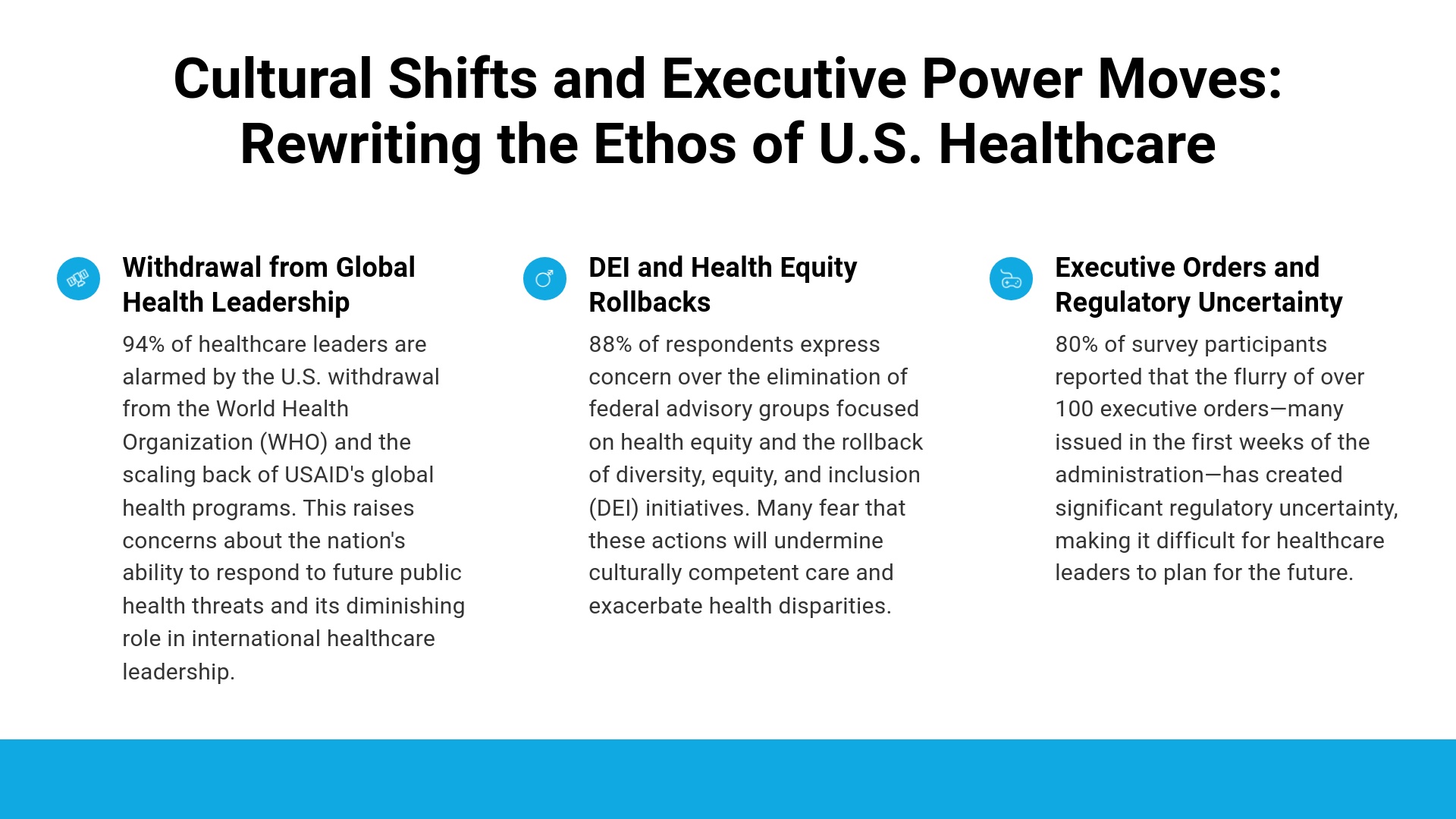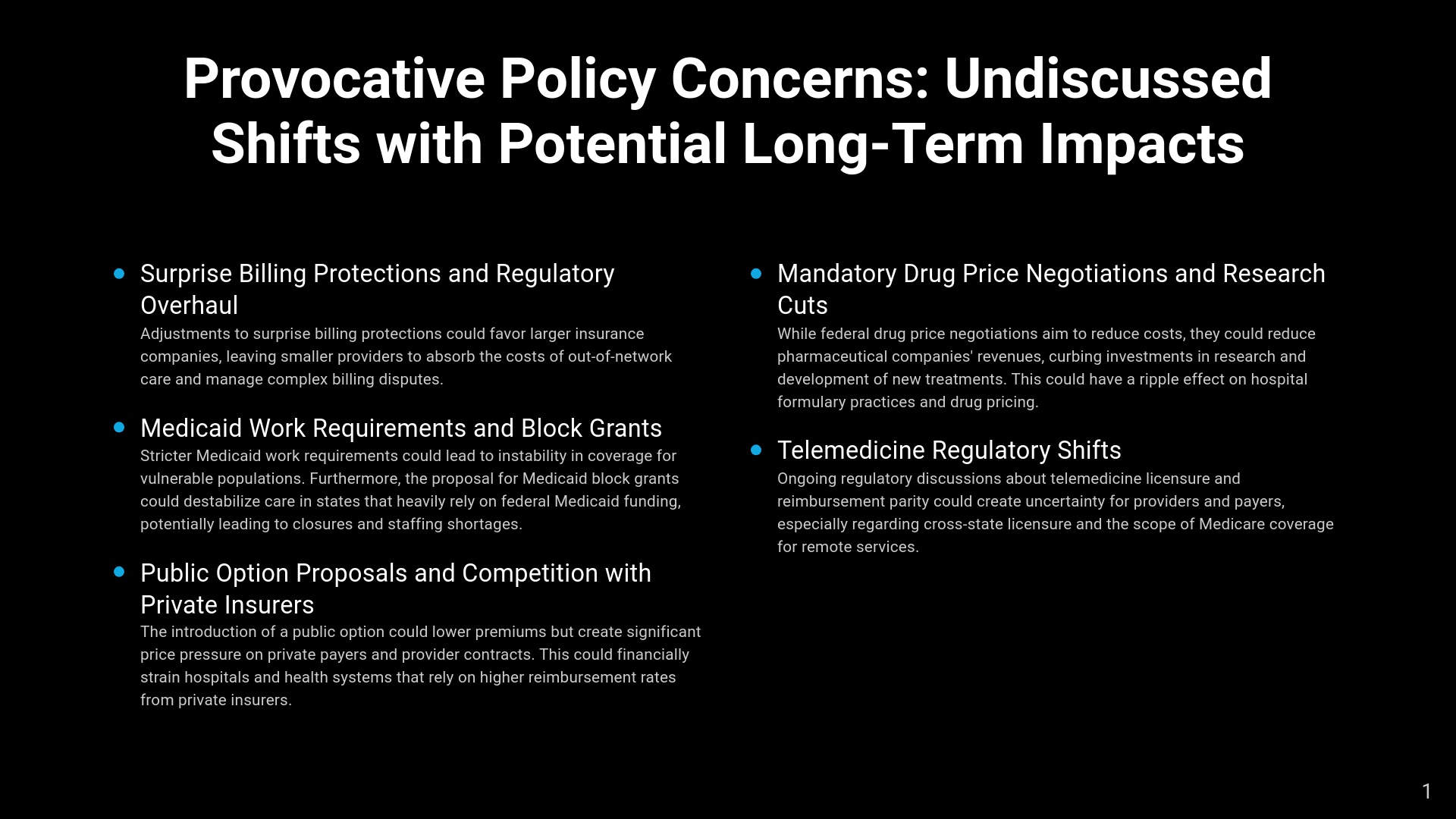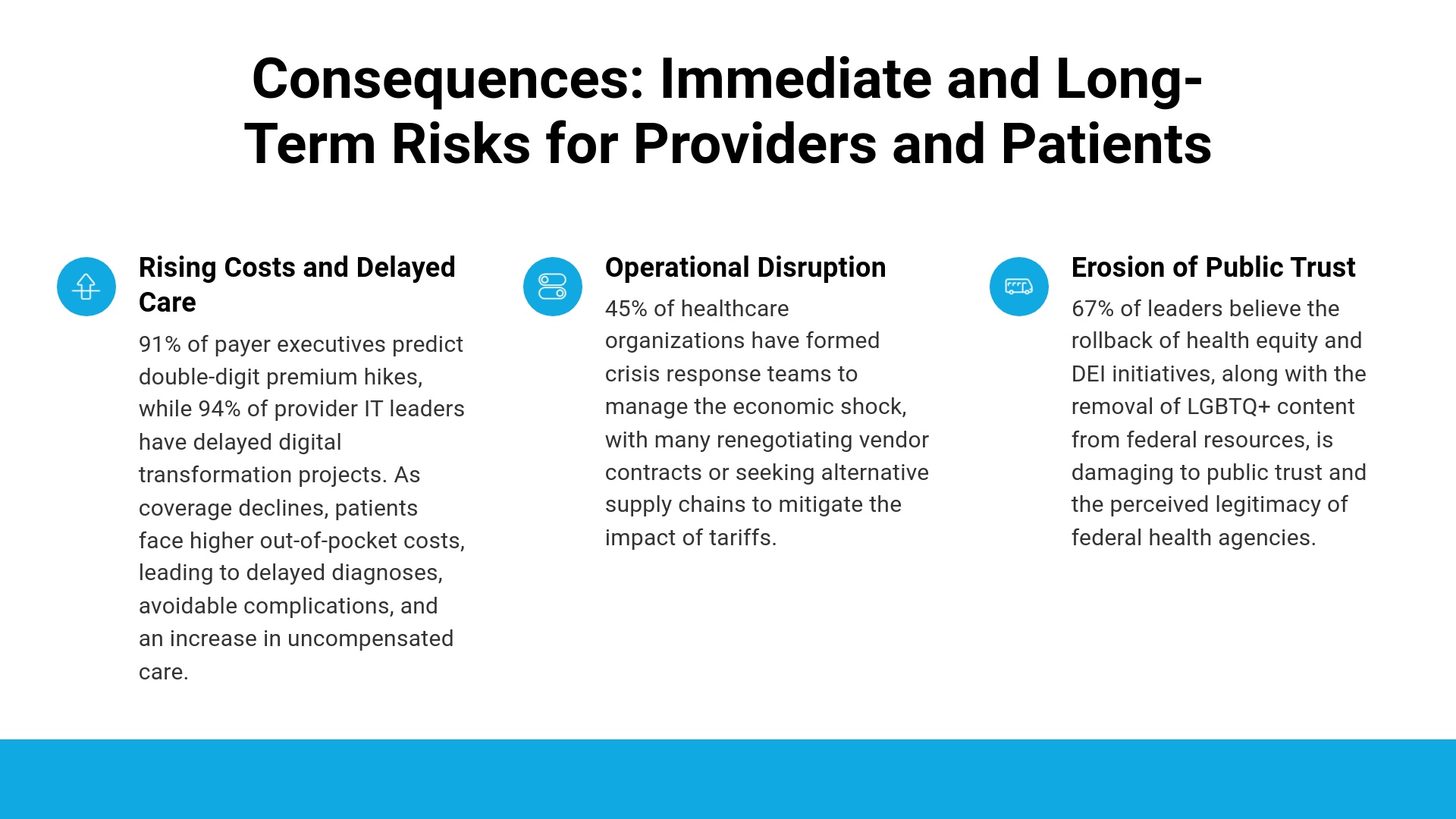Exclusive Polls Capture Concerns from Providers, Hospitals, Health Systems, Payers, and More on Budget Cuts, Reimbursement Rules, and Tariff Impacts Amid Ongoing Policy Shifts
WASHINGTON, DC / ACCESS Newswire / April 28, 2025 / Black Book Research today released findings from six exclusive surveys conducted between January 22 and April 27. 2025, capturing the concerns of 1,664 healthcare leaders across hospitals, health systems, payers, and more.
These leaders provide a clear view of the far-reaching effects of early policy decisions in President Trump's second term, revealing rising costs, workforce instability, and access to care disruptions.
The findings highlight how federal policy shifts are impacting the healthcare sector, with a focus on cost-containment measures, the rollback of Affordable Care Act (ACA) provisions, Medicaid funding cuts, and workforce layoffs. The surveys show the significant strain these changes are placing on healthcare organizations, and the long-term risks they pose for patients.
Cost-Driven Actions: Providers Face Financial Strain and Operational Challenges
The Trump administration's cost-containment policies are having an immediate and wide-reaching impact on healthcare organizations across the U.S.
Emergency Budget Recalibration:
83% of healthcare leaders report entering "emergency budget recalibration mode," with nearly half of all organizations slashing capital project budgets by up to 30% in response to rising tariffs on medical imports and sweeping federal budget cuts.
Agency Layoffs and Program Cuts:
The elimination of an estimated 20,000 federal positions, including staff at the CDC, NIH, and FDA, has led to the abrupt cancellation of critical programs, such as grants for HIV research, autism, chronic disease, teen pregnancy, and substance abuse prevention.
ACA and Medicaid Rollbacks:
93% of healthcare leaders are deeply concerned about the rollback of ACA support, especially the reduction of navigator funding and the rescinding of extended enrollment periods. These changes could result in the loss of coverage for between 750,000 and 2 million Americans, with the most severe impact in Southern and rural states.
Medicaid Funding Threatened:
The administration's proposed $880 billion cut to Medicaid over 10 years is seen as a direct threat to expanded coverage, particularly for low-income and pediatric populations. Experts warn these cuts could lead to hospital closures, staffing shortages, and a surge in uncompensated care.
Cultural Shifts and Executive Power Moves: Rewriting the Ethos of U.S. Healthcare
The Trump administration's policy shifts are not only financial but also aim to reshape the cultural and regulatory landscape of U.S. healthcare.
Withdrawal from Global Health Leadership:
94% of healthcare leaders are alarmed by the U.S. withdrawal from the World Health Organization (WHO) and the scaling back of USAID's global health programs. This raises concerns about the nation's ability to respond to future public health threats and its diminishing role in international healthcare leadership.
DEI and Health Equity Rollbacks:
88% of respondents express concern over the elimination of federal advisory groups focused on health equity and the rollback of diversity, equity, and inclusion (DEI) initiatives. Many fear that these actions will undermine culturally competent care and exacerbate health disparities.
Executive Orders and Regulatory Uncertainty:
80% of survey participants reported that the flurry of over 100 executive orders-many issued in the first weeks of the administration-has created significant regulatory uncertainty, making it difficult for healthcare leaders to plan for the future.
Provocative Policy Concerns: Undiscussed Shifts with Potential Long-Term Impacts
In addition to the major policy shifts, the Black Book Research survey also identifies other potentially disruptive policy changes that have yet to be fully discussed in mainstream discourse.
Surprise Billing Protections and Regulatory Overhaul:
Adjustments to surprise billing protections could favor larger insurance companies, leaving smaller providers to absorb the costs of out-of-network care and manage complex billing disputes.
Medicaid Work Requirements and Block Grants:
Stricter Medicaid work requirements could lead to instability in coverage for vulnerable populations. Furthermore, the proposal for Medicaid block grants could destabilize care in states that heavily rely on federal Medicaid funding, potentially leading to closures and staffing shortages.
Public Option Proposals and Competition with Private Insurers:
The introduction of a public option could lower premiums but create significant price pressure on private payers and provider contracts. This could financially strain hospitals and health systems that rely on higher reimbursement rates from private insurers.
Mandatory Drug Price Negotiations and Research Cuts:
While federal drug price negotiations aim to reduce costs, they could reduce pharmaceutical companies' revenues, curbing investments in research and development of new treatments. This could have a ripple effect on hospital formulary practices and drug pricing.
Telemedicine Regulatory Shifts:
Ongoing regulatory discussions about telemedicine licensure and reimbursement parity could create uncertainty for providers and payers, especially regarding cross-state licensure and the scope of Medicare coverage for remote services.
Consequences: Immediate and Long-Term Risks for Providers and Patients
The survey reveals that healthcare leaders foresee significant risks stemming from the Trump administration's policy changes:
Rising Costs and Delayed Care:
91% of payer executives predict double-digit premium hikes, while 94% of provider IT leaders have delayed digital transformation projects. As coverage declines, patients face higher out-of-pocket costs, leading to delayed diagnoses, avoidable complications, and an increase in uncompensated care.
Operational Disruption:
45% of healthcare organizations have formed crisis response teams to manage the economic shock, with many renegotiating vendor contracts or seeking alternative supply chains to mitigate the impact of tariffs.
Erosion of Public Trust:
67% of leaders believe the rollback of health equity and DEI initiatives, along with the removal of LGBTQ+ content from federal resources, is damaging to public trust and the perceived legitimacy of federal health agencies.
Workforce Instability:
Federal layoffs have exacerbated concerns about unemployment, particularly in underserved communities, further reducing access to care.
Healthcare Leaders' Priorities and Recommendations
The Black Book Research survey highlights key priorities among healthcare leaders:
Safeguard Coverage:
81% of healthcare leaders favor a balanced approach that preserves access to care while maintaining program integrity. Respondents emphasize the need for policymakers to protect Medicaid funding, maintain or expand ACA subsidies, and extend enrollment periods for vulnerable populations.
Promote Transparency and Stability:
Healthcare leaders call for greater transparency in federal decision-making and more consistent communication to reduce uncertainty and support long-term planning.
Invest in Innovation and Equity:
Despite ongoing cost pressures, healthcare leaders stress the continued importance of investing in medical research, digital health, and culturally competent care to address the evolving needs of diverse patient populations.
"These policy changes are creating significant challenges for healthcare systems. Operations are under strain, capital projects are delayed, and sourcing is disrupted. At the same time, patient affordability is becoming more uncertain. The next few months will be a critical period for healthcare organizations as they adapt to these shifts while maintaining care delivery. Healthcare leaders are focused on protecting coverage, ensuring stability, and navigating a rapidly changing landscape as they face these new policy dynamics," said Doug Brown, Founder of Black Book Research
About Black Book
Black Book Market Research is committed to delivering independent, data-driven insights to the healthcare industry, grounded in verified client experiences and globally recognized research standards. We maintain neutrality by refraining from offering consulting services, performance improvement programs, or acting as intermediaries between IT buyers and vendors. This ensures that our rankings, reports, and recognitions remain free from commercial bias. Our mission is built on trust, transparency, and the belief that healthcare decisions deserve to be guided by real experiences-not commercial influence. Read more on Linkedin: https://www.linkedin.com/company/blackbookmarketresearchllc/ X: https://x.com/blackbookpolls Download gratis 2025 Black Book Reports at https://blackbookmarketresearch.com/ Media Contact: research@blackbookmarketresearch.com 800.863.7590
Contact Information
Press Office
research@blackbookmarketresearch.com
8008637590
SOURCE: Black Book Research
Related Images


View the original press release on ACCESS Newswire
